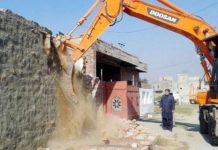By Uzma Zafar
Islamabad: As the novel coronavirus COVID-19 has turned into a pandemic, it is imperative that we all take measures to keep ourselves safe from a disease that has taken around 5,000 lives and infected 131,500 globally.
In Pakistan, there are 21 confirmed cases so far of COVID-19, with the highest number of cases, 15, reported from Sindh.
Here’s what to do when you suspect you have the coronavirus or someone near you can be a potential patient.
Check for symptoms
In case of fever, cough and shortness of breath, it is a good idea to get tested for coronavirus.
Dr Wajeeha Qasim, who works for a private hospital, said that those who have an extreme or persistent cough should also get tested for the coronavirus to rule out any suspicion. She said that those people who fear they might have come into contact with a suspected patient, or been somewhere the virus has confirmed cases, should try to check for symptoms and get themselves tested in the case. Dr Qasim said that any respiratory issues need to be identified immediately.
Call the helpline
As per the government’s directives, if you suspect that you may have the symptoms call the state helpline (1166) or your healthcare provider.
Precautions
One should maintain a distance of 1 metre when a patient coughs or sneezes, Dr Qasim said, adding that maintaining distance is important. “It is advisable to not share the same bed, towels, utensils, etc with someone who is suspected of having the disease. The suspected person should use only one washroom in the house, while others should avoid using it,” she added.
She further said that if it is a family member, then it is better that the room or place they are in should be avoided. “Only one person can help them out with giving them food or things of daily use.”
The suspected carrier of the virus should wear a mask, and so should everyone coming into contact with them, she said.
Wash your hands
Wash your hands with clean, running water and apply soap. Lather your hands, including the backs, between your fingers, and under your nails and scrub for at least 20 seconds. Rinse.
Dr Qasim advised that as a major precaution for everyone, handwash should be frequently used (as much as more than 20 times per day), along with hand sanitizer.
Limit contact
If you have returned from an affected area in the last two weeks, stay indoors and avoid contact with other people for 14 days. This means not going to work, school or public areas. On should cover their mouth and nose with a tissue in case of a cough or sneeze, then throw the tissue in the bin and wash their hands. If you do not have a tissue to hand, cough or sneeze into your elbow rather than your hands.
Face masks offer some protection as they block liquid droplets. However, they do not block smaller aerosol particles that can pass through the material of the mask.



